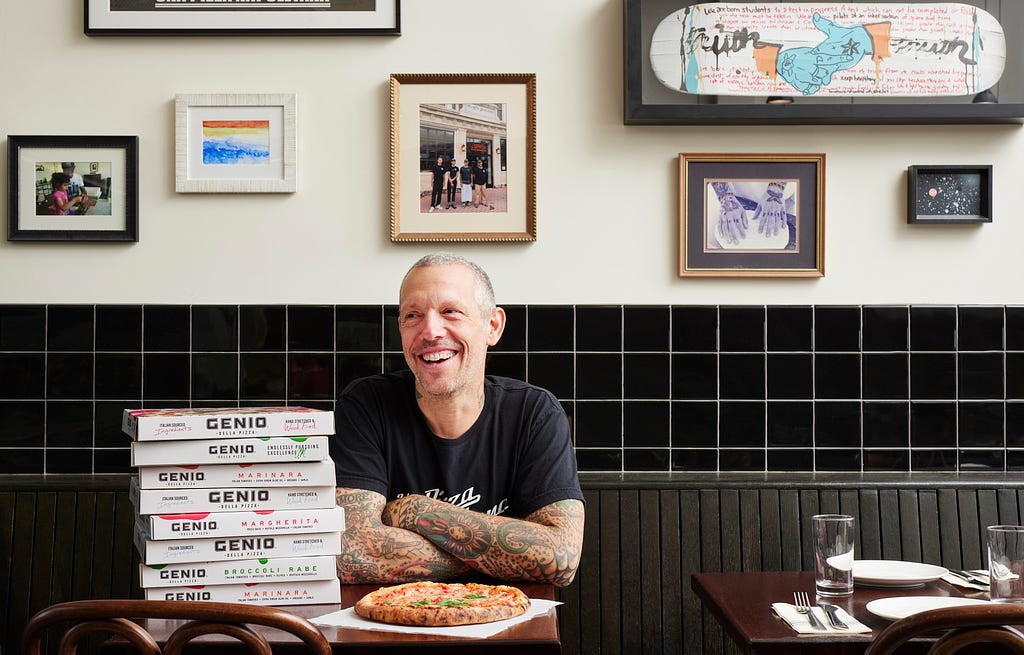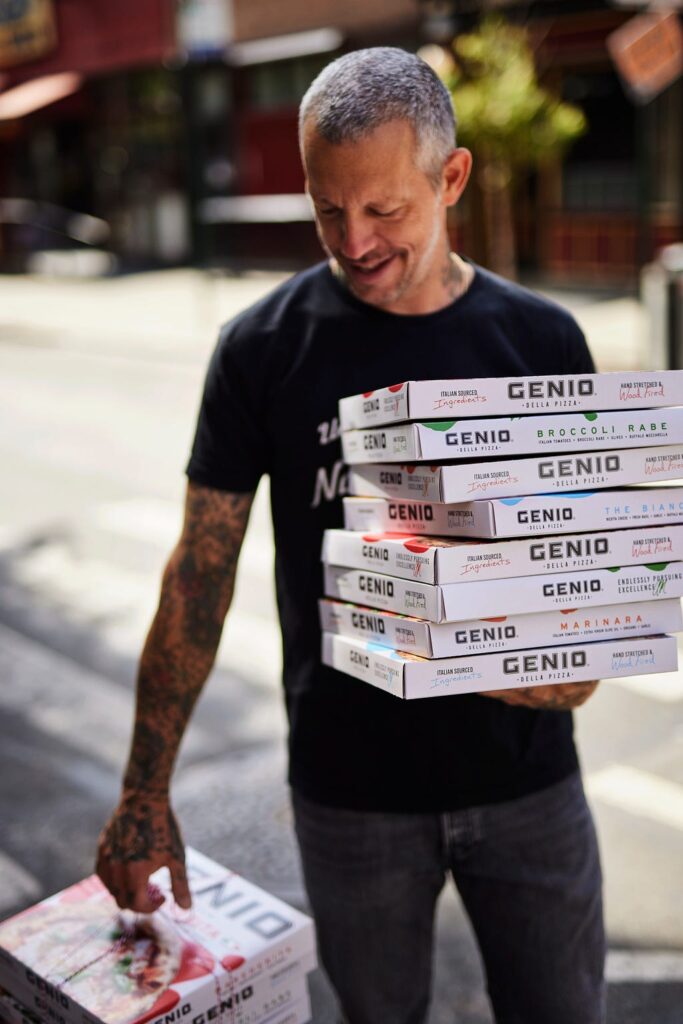Anthony Mangieri of Genio Della Pizza On 5 Things You Need To Create a Successful Food or Beverage Brand
An Interview With Martita Mestey
The first step is to ask what reason you have to create a product. Does the world need that product? Is it something that will make life better or inspire people? In a nutshell, is it worth creating?
As a part of our series called “5 Things You Need To Create a Successful Food or Beverage Brand”, I had the pleasure of interviewing Anthony Mangieri.
Anthony Mangieri is a pioneer of Neapolitan-style pizza in the United States. A native of New Jersey, Anthony grew up in a close-knit Italian-American family and developed a pizza obsession from a young age. In 1996, he established Una Pizza Napoletana in Point Pleasant Beach, NJ and moving it each time he relocated to a different city including San Francisco before settling back on the East Coast on the Lower East Side of Manhattan. Una has continued to garner praise, claiming the #1 spot on 50 Top Pizza’s 2022 global ranking. In 2022, Anthony launched Genio Della Pizza, a frozen product he’s spent three years working on to reclaim quality in the freezer section.
Thank you so much for doing this with us! Before we dive in, our readers would love to learn a bit more about you. Can you tell us a bit about your “childhood backstory”?
I was born and raised in New Jersey in an Italian-American family. My mom and grandma were big influences on me and encouraged my interest in pizza which started when I was just a small kid. I convinced my mom to drive me to every well-known pizza shop in the tri-state area and she also took me on trips to Naples, which is where I fell in love with pizza.
Can you share with us the story of the “ah ha” moment that led to the creation of the food or beverage brand you are leading?
Honestly, it was after we’d started but in the R&D phase, which was so long and arduous. I knew I wanted to create a frozen pizza that would be something people looked forward to — not just a convenience food — but after dozens (hundreds?!) of recipe tests I was stressed out because it just didn’t seem possible. When I ate the one that would end up as the final recipe for Genio Della Pizza, that was my “ah ha” moment because I knew we’d created something that just has not existed in a grocer’s freezer before.
Can you share a story about the funniest mistake you made when you were first starting? Can you tell us what lesson you learned from that?
It might not be the funniest mistake, but the biggest lesson I learned was to trust my instincts and that is what I would recommend to other people starting a CPG. Don’t think too hard on what the “angle” is or what works for marketing. When you’re creating the product you have to stick to what you believe in, what feels right, natural and honest to you. Everything else then falls into place.
What are the most common mistakes you have seen people make when they start a food or beverage line? What can be done to avoid those errors?
I think one of the biggest mistakes is creating products that are already out there. Not to say frozen pizza hasn’t existed for decades — it has. But has a frozen pizza that is made with naturally fermented dough, hand stretched and topped with high quality, natural ingredients existed before? I think so much of the CPG world looks the same so you want to approach creating a CPG brand like you’d approach anything else. Don’t think, “What can I do to make it a hit?” but instead, “What can I do to make it great?”
Let’s imagine that someone reading this interview has an idea for a product that they would like to produce. What are the first few steps that you would recommend that they take?
The first step is to ask what reason you have to create a product. Does the world need that product? Is it something that will make life better or inspire people? In a nutshell, is it worth creating?
Second: I think it’s important to really spend the time and think about how big or how small you want it to be in terms of scalability. If the goal is to stay small and boutique, you don’t have to consider scalability but if the dream is to go national, make sure it is actually scalable. If someone creates a product and it’s a big hit, they have to be ready to roll to keep up with demand. It’s important to have a plan and timeline so you won’t be in a situation where you lose an opportunity for growth.
We knew we wanted to get the best frozen pizza into the hands and homes of as many people as possible, which is why we didn’t go the route of flash freezing the pizza I make at Una Pizza Napoletana [Anthony’s Lower East Side pizzeria which is ranked #1 in the world by Italy’s Top 50 Pizza association]. We would never be able to produce the number of pizzas required to reach people around the country.
Many people have good ideas all the time. But some people seem to struggle in taking a good idea and translating it into an actual business. How would you encourage someone to overcome this hurdle?
I would encourage people to make sure they have the bandwidth to make their idea a reality. A great idea doesn’t result in a win, the work results in a win. The idea is just a seed and the money is the stage, not the performer which is the work. People can throw money at you but without the performer — the work — it won’t turn into a show.
There are many invention development consultants. Would you recommend that a person with a new idea hire such a consultant, or should they try to strike out on their own?
It depends. I definitely think it’s worth the investment. I needed people to teach me the ropes of the CPG and food store world because it was all new to me. If you find a really good consultant, they’ll teach you so well that you’re able to take the baton from them and move on, armed with that knowledge.
What are your thoughts about bootstrapping vs looking for venture capital? What is the best way to decide if you should do either one?
This goes back to the discussion about scalability. It really depends on what your end game is; what your short and long term goals are. Maybe you are making cookies and your goal is to get the cool gourmet shop in town to carry those cookies in which case you might not need venture capital. But if you want every single food store in your state to sell your cookies, you’ll need funds for packaging, licensing, distribution, insurance, slotting fees, promotion, etc.
Can you share thoughts from your experience about how to file a patent, how to source good raw ingredients, how to source a good manufacturer, and how to find a retailer or distributor?
Hire a patent lawyer specializing in CPG patents and trademarks. Get a broker who can help secure distribution; if you want to stay local find someone who specializes in that area, or a larger broker who can cover the entire country. You also want to consider the brokers’ specialities. Are you looking to get your product into the conventional grocery stores, natural food stores or high-end speciality markets? The right broker will have expertise in the area you want for your product.
For us, it was really important to find a manufacturer who was open to working in tandem with us to shape and develop the product into the one we had in mind. Some are more closed off to their partners and will tell you, “Here are the ones we can make” and you choose one to put your label on. My goal was to find someone who wanted to push the envelope with us so we could learn and evolve together.

Can you share your ideas about how to create a product that people really love and are ‘crazy about’?
I’ve been making pizza for over 27 years at Una Pizza Napoletana — making the dough by hand every day the restaurant has been open. I knew we couldn’t duplicate what was being done at my restaurant but we have the same level of passion, commitment to quality and dedication to the craft when it came to developing Genio Della Pizza. Just because a product is for a larger audience doesn’t mean you should compromise on the values you had when you were first starting out. I’ve been blessed to have loyal customers share their love of Una’s pizza with me over the years which inspired my desire to get a great pizza out to a larger audience through Genio Della Pizza.
Ok. We are nearly done. Here are our final questions. How have you used your success to make the world a better place?
Hopefully I’m not making the world a worse place, ha! My team and I just try to be good — good to our customers, good to the people we work with and show that success doesn’t have to change that. I still get up every morning, excited about making the dough at Una Pizza Napoletana and that excitement is there when I go to the factory in Italy to oversee Genio. I’d like to think that hard work and a respect for people go a long way, especially in the world today.
You are an inspiration to a great many people. If you could inspire a movement that would bring the most amount of good to the most amount of people, what would that be? You never know what your idea can trigger.
With Genio Della Pizza, I really wanted to offer a frozen pizza to people that is delicious, made with clean ingredients and made you feel good. Hopefully it will inspire people to create products made with care, using real ingredients. Convenience and high-quality shouldn’t be mutually exclusive.
Thank you for these fantastic insights. We greatly appreciate the time you spent on this.
Anthony Mangieri of Genio Della Pizza On 5 Things You Need To Create a Successful Food or Beverage… was originally published in Authority Magazine on Medium, where people are continuing the conversation by highlighting and responding to this story.
